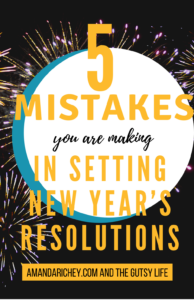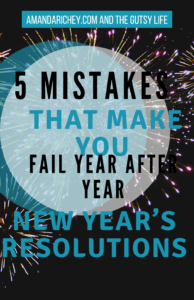
Are you the type of person who loves to set New Year’s Resolutions?
Are you someone who dreads it?
Have you made many a plan to stick with on January 1st, only to find yourself midway through February (who are we kidding…January) and you have given up for this year and already vowed to make it happen next year?
I can relate.
I have set many an intention, made many a goal, and New Year’s Resolution only to lose steam, lose interest, get distracted…and then do it all over again the next year.
We all have.
There is nothing wrong with you.
The key, is that most of us don’t understand what it actually takes to stick with a new goal/resolution/habit.
That is why I am sharing the five mistakes you (and everyone) are making that are keeping you from actually sticking to your goals.
- Not Understanding Your Brain
- Thinking too Big
- Underestimating the Small
- Not Knowing the Real Why Behind Your Goal
- Winging It
1. Not Understanding Your Brain
What most of us don’t realize when we set out on January 1st to make some big shifts in our lives, is that our brain has a VERY different goal and that many of OUR goals are actively working against our brain and its goal, which is to KEEP YOU ALIVE.
The gist is this: your brain is hardwired for survival. (Blame it on 200,000 years plus of evolution!). In survival mode, the brain focuses scanning the world for any possible threat and then keeping you from that perceived threat. Your brain perceives any potential for mental or physical harm as a threat. When your brain perceives a threat, it moves into fear mode, setting off alarm bells that will prevent you from moving towards the threat. That means when you are trying to do something new or different your brain will try to stop you, because new=unknown=potential threat.
Your brain also wants to conserve energy at all costs. It does this in two ways, one by creating habit loops. If your brain has found a path it has traveled before (a neural path) it will travel it again and again, because it knows it’s safe, creating a deeply entrenched habit loop that saves energy. This is great when it comes to breathing or moving our limbs without thinking, but these entrenched pathways or habit loops are then controlled by our subconscious and our subconscious mind believes everything it takes in because it has no analytical filter. This means that most of the time our brain is in conserve energy mode and thus our subconscious mind is running the show. Not good when you are trying to do something new because new=new neural pathway=conscious mind=lots of energy.
The second way your brain conserves energy is by filtering messages using the Reticular Activating System (RAS). The RAS filters incoming messages and only allowing important messages through to the higher brain centers. The type of sensory information allowed through the ‘gates’ determines where our attention will be directed AND the RAS only lets in information that we have given attention to in the past. Therefore your brain will not allow, or will struggle to recognize, new and different information (a must when doing something new).
All of this is to say, trying to do new and hard things (goals) will require understanding your brain’s goal (to keep you alive) and understanding how you can help your brain to trust the new habits and actions you want to take to create the goals you have set for yourself.
2. Thinking Too Big
This may sound like a bummer but we often set out on January 1st with, shall we say, an over inflated view of ourselves and our capabilities. Also referred to as a Perfectionist Fantasy. We think that somehow we will miraculously be someone who day prior could not get out of bed before 10 am but some how on January 1st we have transformed into a being who can get up at 5am, go for a run, meditate for 30 min, write in a journal, eat a healthy protein rich breakfast, and then start the work day at 8am. Not to mention also have a goal to increase sales at work, start writing that book, and start a new hobby.
Sound familiar?
Now, given what you just learned about your brain, what do you think your brain is going to be doing?
Freaking out and set off alarm bells to STOP.
Yep, that’s right. You have just overwhelmed your brain and made it 10 times more unlikely that after the first week the snooze alarm will become your best friend, and so will the doughnut for breakfast, and that book could be written next year and…
Get the picture?
Yes, you can have all of those things as goals for the year BUT you have to start small.
Which brings me to point 3…
3. Underestimating the Small
Small daily actions are WHO YOU ARE. Setting resolutions and goals means making changes to who you are. You need to look at the small daily actions, and make changes there first.
What is one small thing that you can do, consistently, to move you in the direction of your goal?
Is it just being the person who gets up when their alarm goes off every day, and doesn’t hit snooze?
Is it someone who commits to 10 min of journaling every day, no matter what?
Is it being someone who meditates for 5 min every day, without fail?
Is it someone who always eats one fruit and one vegetable before lunch every day?
Is it someone who doesn’t pick up their phone before 9 am every day?
What is one small daily action you can commit to that will move you towards your goal? The minimum you can do? Start small. Be consistent. Build trust in yourself. Build your brain’s confidence that new is not scary and dangerous, then add from there. After you have mastered the first change, add another.
Maybe you don’t hit snooze anymore, AND now you get up every day at 6am instead of only setting an alarm on work days.
Maybe it is setting a specific time every day for your mental health to journal for 10 and meditate for 10 min, etc.
Maybe it is incorporating a meal plan into your morning routine as well as that fruit and vegetable.
Have you heard of the concept of compounding interest? Small singular action over time compounds into massive results!
Do you see how you can slowly build trust, safety, and success with this method? Yes, it will be slower, but it has the potential to stick. To actually change who you are. On January 1st you wont be doing all the things on your goal list, but by March you will have such confidence in yourself and your ability to stick to your plans that you will be adding more parts of your goal more frequently and making change more rapidly. And that is what you are really looking for- Trust. And that leads me to number 4.
4. Not Knowing Your Real Why Behind Your Goal
We often think our goals are about accomplishments and accolades: write the book, make the sales, lose the weight. But often our goals are really about something else entirely. They are about how we want to feel about ourselves. What you want in life is really not about the goals. It is not about the accomplishments. It is not about the circumstances. What you really want in life is probably more about acceptance, and trust, and love for yourself. Its more about being the person who can stick to a plan, than the person who is 125 lb, or published a book, or made $100k in their business.
Ask yourself:
Why do I want this goal?
What do you hope will change?
What is it that you think you will feel or think about yourself once you have that goal?
The answer- the real goal- it is available to you right now. If you really want to stick to your goals you need to understand what you really want to feel about yourself, and work on feeling that now. Because you cannot have the goal and the accomplishments without first changing your thoughts about yourself.
The final mistake you (and all of us) are making when it comes to ACTUALLY achieving our goals and New Year’s Resolutions…
5. Winging it
You are trying to do this by yourself. with no accountability, no help, or no plan. You are probably being too vague. Not putting it down on paper, not making a concise plan and checking the plan daily. You are winging it. You need a plan and you need some help. You will not create lasting change in your life without some form of a plan and some way to check and see how your plan is working or not working and then recalibrating. This is best done with a good accountability coach or partner. Someone who already has their sh**t together. Someone who is already doing some of the things you wish to be doing. NOT your lowlife roommate who can’t get up before noon, or your well meaning mother who loves you nonmatter if you stick to your plan or not. Okay? If you are serious about change you have to write it down, check in, and tell someone who will hold you to that plan.
If you are really serious about making changes in your life, ones that will actually stick, and are really serious about achieving some big goals, then I encourage you to look at how you can start small, change your thoughts about yourself first, make a plan, and get some help!
I am offering a FREE workshop about how to ACTUALLY achieve your New Year’s resolutions. I would encourage you to check it out, because these are only the first steps!



